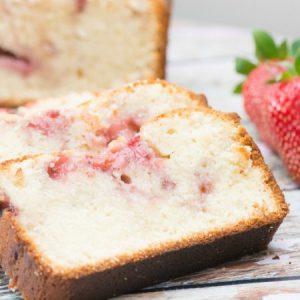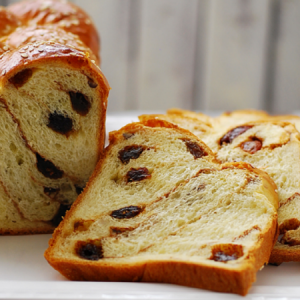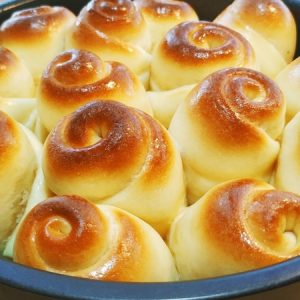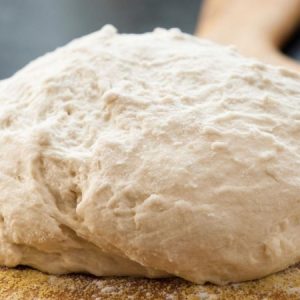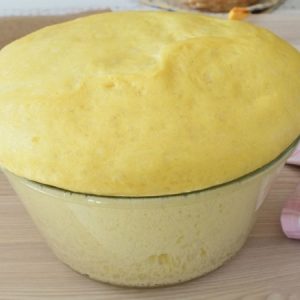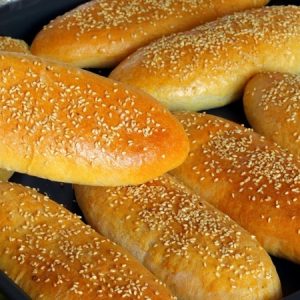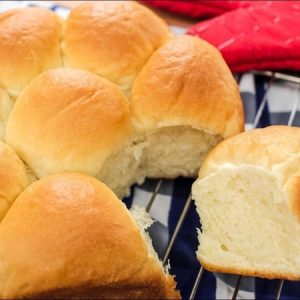Using a roux starter, the bread is incredibly soft, tender, and fluffy and stays so for days without preservatives. After making the roux, you add the bread ingredients to a stand mixer. You can do this by hand, but it will take longer and require quite a bit of kneading. The dough needs to be kneaded until it can pass the windowpane test.
The windowpane test checks whether the gluten has been developed by testing the dough’s elasticity. You should be able to stretch the dough out without it breaking until it becomes thin and sheer enough that light can pass through if held up to a light or window. If the dough tears immediately when you try to stretch it, then it is not ready.

The dough is divided into individual rolls and then proofed for a second time, about 15 minutes. Then, the dough is rolled out, folded into thirds, rolled back up, and shaped back into balls. In your bowl, whisk together the flour, instant yeast, salt, and milk. In another bowl or large liquid measuring cup, combine the milk, egg, melted butter, and the cooled Tangzhong.
Pour the liquid over the dry ingredients and knead the heck out. It will initially look very sticky and wet, but It will become nice and pliable as the kneading progresses. Let it knead for 15 to 20 minutes until it’s slightly sticky but not messy. You should be able to stretch it between your hands into a thin film without it breaking right away.
When it starts tearing, it will tear circularly. Place your dough in a greased bowl, then cover it with plastic wrap to raise. After 60 to 90 minutes, it should poof up like this. Turn it on a work surface; you shouldn’t need to dust anything with flour.
Divide the dough into equal pieces. Place the rolls in the prepared pan and cover loosely with plastic wrap until they poof up once again 40 to 50 minutes. Give them a gentle brushing of egg wash, and then into the oven they go. Bake until gorgeous and golden brown, 30 to 35 minutes, then slather them with some melted butter.
Ingredients;
- 2½ cups bread flour
- 1/2 tsp salt
- Three tbsp+2 tsp sugar
- 2 tsp instant yeast
- One large egg
- 1/2 cup fat-free milk or low-fat milk
- 120 g roux
- 3 tbsp unsalted butter cut into small pieces, softened to room temperature
- One large egg whisked for a shiny egg wash finish
Instructions;
- Combine the flour, salt, sugar and instant yeast in a stand mixer bowl. Make a well in the centre.
- In a separate bowl, whisk together the wet ingredients: egg and milk. Add this to the well of the dry ingredients.
- Use the dough hook attachment and mix quickly until your dough comes together. Add in the butter and continue mixing on medium to high speed.
- Mix/knead for about 18-20 minutes until the dough is no longer sticky and elastic. Use the windowpane test to test the elasticity.
- Take a piece of dough and stretch it out. You should be able to stretch it until the dough becomes a very thin membrane that is almost sheer and lets in light.
- When you poke a hole in the thin membrane, it should form a close-to-perfect circle. It is not ready if the dough breaks before you can stretch it this far.
- Gather the dough into a ball shape. Take a large bowl and grease it with oil. Place dough into a greased bowl and cover with plastic wrap. Let it proof until it’s doubled in size, about 40 minutes.
- Deflate and divide the dough into nine equal portions. Knead into ball shapes. Cover with plastic wrap and let rest for 15 minutes.
- Roll one portion with a rolling pin into an oval shape. Fold one end of the dough to meet the middle of the oval. Take the other end and fold to meet on top.
- Turn the dough over so the folds face down, roll, and flatten the dough with a rolling pin. Flip the dough again so the folded side faces up.
- Roll the dough up from top to bottom. Take both ends and fold them down until they meet at the bottom.
- Stretch and move the top portion of the dough around until it forms a ball at the top, and the ends are tucked into the bottom.
- Place the balls into an 8 x 8 baking pan lined with parchment paper. Cover with plastic wrap. Leave it for the second round of proofing, about 45 to 60 minutes, until doubled in size.
- Brush egg wash on the surface of the buns, then bake in a pre-heated 330°F oven for 30-35 minutes or until golden brown. Transfer onto a wire rack and let cool completely.


